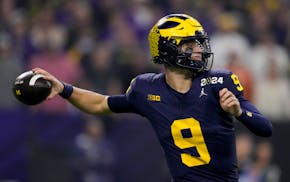During his time as a Vikings executive, Kevin Warren became known for honesty and caution. So when Warren, the newish commissioner of the Big Ten, said this week that his conference might not play football this fall, you should have heard alarm bells.
In the past couple of weeks, the Big Ten canceled nonconference games, the Dallas schools superintendent expressed doubt that there will be high school football in Texas, the NFL canceled two weeks of preseason games, Houston Texans star J.J. Watt said he wouldn't play this season if he has to wear a face shield, Bucs left tackle Donovan Smith said playing "does not seem like a risk worth taking," the NFL Players Association expressed a preference for canceling the rest of the preseason, the NFL asked for 35% of players' salaries to be placed in escrow to help manage league costs and the league banned socializing on the field after games.
In other sports, key players have opted out or considered doing so, with San Francisco Giants star catcher Buster Posey declining to play.
Warren's words and those of Dallas superintendent Michael Hinojosa might be the most alarming to football fans and anyone else trying to decide how seriously to take the coronavirus.
The Big Ten Conference, Big Ten schools and the Big Ten Network will lose a massive amount of money if football isn't played.
And to understand the importance of prep football in Texas, you can watch "Friday Night Lights" or just think of hockey in our state and spread it out over a space that is 229% larger than Minnesota. Football is even bigger in Texas than hockey is in Minnesota.
All of these developments raise two questions:
Will there be football this fall?
Should there be football this fall?
There are three categories of football to address.
The first is nonrevenue football — youth leagues, middle schools, high schools, smaller colleges. These are teams that can't afford to place their players in a bubble. A high school player not only could spread the virus to his teammates, he could carry the virus home to his family. For football teams with no major financial incentive to play, why would you take the risk of getting people sick, and perhaps getting sued?
The second category is revenue-producing college teams. They could be better prepared to keep their players within some kind of functional bubble, and they have financial incentive to play, but can they ask players to risk their health for an institution that refuses to pay them?
The third category is the NFL. NFL players get paid and are represented by a union. They are adults who can accept the risks of playing during a pandemic.
But should they play? And should they be asked to?
The NFL is simultaneously telling its players that they can smash headfirst into each other for 60 minutes but it's not safe to exchange jerseys after time expires.
It feels like we're on our way to cancellations at every level of football below the NFL.
The NFL has never cared much about player safety, so the question is whether players will object to playing, and how many would have to opt out for the league to cancel or postpone the season.
Had America handled the pandemic more intelligently, the football season would not be in doubt. With cases spiking all over the country, the sports world is merely reflecting America's state of crisis.
If the virus were a hoax or a passing concern, NFL teams, all of which are owned by billionaire businesspeople, would be playing their full schedules and making their full profits. They have been forced to react to the virus because the virus, if you want to put it in sporting terms, is beating America in a historic blowout.
In Vikings terms, right now it's Virus 41, America donut.
Want sports? Wear a mask. Practice social distancing. Care about someone other than yourself, even if that someone is a player on your favorite NFL team.
Jim Souhan's podcast can be heard at TalkNorth.com. On Twitter: @SouhanStrib. • jsouhan@startribune.com

Souhan: Wolves fans made Game 1 special. Now bring on Game 2.

Souhan: Should Vikings even consider McCarthy in NFL draft?

Souhan: NAW erases Suns' lead, Game 1 advantage with big performance

Souhan: This is KAT's chance to prove Flip Saunders was right

